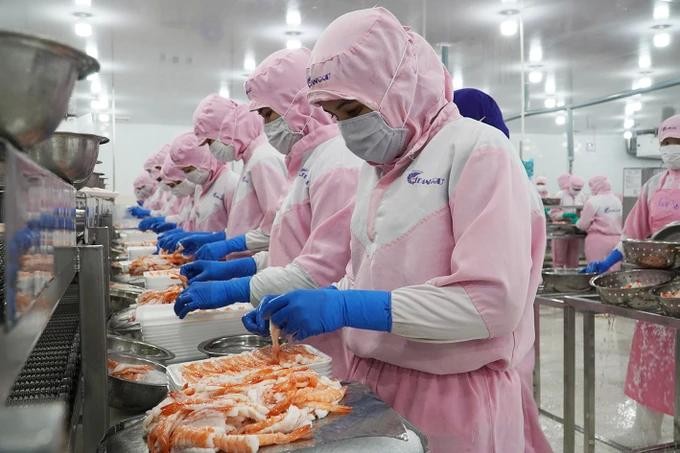Breeders and exporting companies in the Mekong Delta are bumping into difficulties including adverse weather conditions, disease outbreaks, inconsistent supplies of raw shrimp, and elevated logistics expenses.

When he was asked about the new shrimp crop plan, farmer Tran The Dinh from Thanh Thoi Thuan Commune of Tran De District in Soc Trang Province expressed disappointment, noting that no local residents are interested in shrimp farming because of continuous loss.
Farmers would rather leave their shrimp ponds empty than risk incurring losses by continuing to farm. Out of ten households, only half of them continue raising the creature, said breeder Tran The Dinh.
Farmer Dinh stated that last crop, traders purchased shrimp at very low prices, with shrimp above 100 pieces a kg selling for just over VND50,000 a kg and those under 100 pieces a kg selling for nearly VND70,000 a kg.
Additionally, each ton of shrimp requires 1.1 tons of feed, costing nearly VND50 million if traders proposed purchasing on credit or about VND40 million if traders pay in cash, not including expenses for medicine, electricity, land rent (if land is rented), and dealing with diseases. Breeders have continuously suffered loss for years.
Worse, farmer Phan Van Queo residing in Thanh Phu District of Ben Tre Province said that white feces disease in shrimp in recent days has made many high-tech shrimp farming households despair as newly released shrimp died of the disease.
Breeders are currently re-treating their shrimp ponds to remove the source of disease.
As of early September 2024, numerous shrimp farming households in the Mekong Delta provinces, including Ca Mau, Bac Lieu, Soc Trang, and Ben Tre, have begun to abandon their shrimp farms. The primary factor driving this trend is the significant volatility in raw shrimp prices, coupled with consistently high expenses for seeds, feed, and medication.
In addition, partly because of losses and lack of capital from the previous crop, combined with the complicated shrimp disease situation, farmers are hesitant to invest in the new crop.
Trader Huynh Phu Cuong who has been supplying raw shrimp for shrimp processing factories for export in Ca Mau Province said that the current price of a kg of 30 white-leg shrimp is VND170,000 while a kg of 50 shrimp is VND122,000 and 100 shrimp is VND93,000.
This price is higher than the same period last year and farmers are making a profit. But currently people do not have much shrimp to sell because many people have suspended their ponds for a long time.
Shrimp processing facilities in the Mekong Delta are experiencing a scarcity of raw materials. A shrimp processing company in Ca Mau City of Ca Mau Province, expressed that despite it being the peak production season to fulfill orders for the US and EU markets, the shortage of raw shrimp sources is posing challenges for businesses.
Localities in the Mekong Delta are providing necessary instructions for farmers to proactively cope with unusual weather and prevent diseases such as designing ponds according to a multi-stage rearing model, with water circulation, lining with siphon holes at the bottom of the pond; choosing breeds from reputable, branded facilities, with clear origins and facilities, with certificates of facilities qualified to produce and raise aquatic breeds, breeds with quarantine certificates and tested for disease-free.
Deputy Director of the Department of Industry and Trade in Bac Lieu Province To Minh Duong stated that the region is actively assisting processing and exporting companies in enhancing their investment in technology and equipment upgrades. The aim is to expand production capacity and refine the export structure by focusing on developing products that possess competitive advantages and high-added value.
Additionally, there is an emphasis on implementing clean technology to elevate product quality, thereby boosting the value and competitiveness of shrimp products.
Simultaneously, local areas are also promoting businesses to invest in the processing and exporting of new products, diversifying product lines and entering new markets, all while ensuring compliance with export market regulations. This objective is shared by the seafood industry, encompassing the shrimp sector of the Mekong Delta.
According to the Vietnam Association of Seafood Exporters and Producers (VASEP), in the first 8 months of 2024, the cumulative seafood export turnover reached nearly US$6.3 billion, an increase of nearly 9 percent over the same period last year. Of which, shrimp export turnover reached nearly US$2.4 billion, an increase of 9 percent over the same period last year.
























